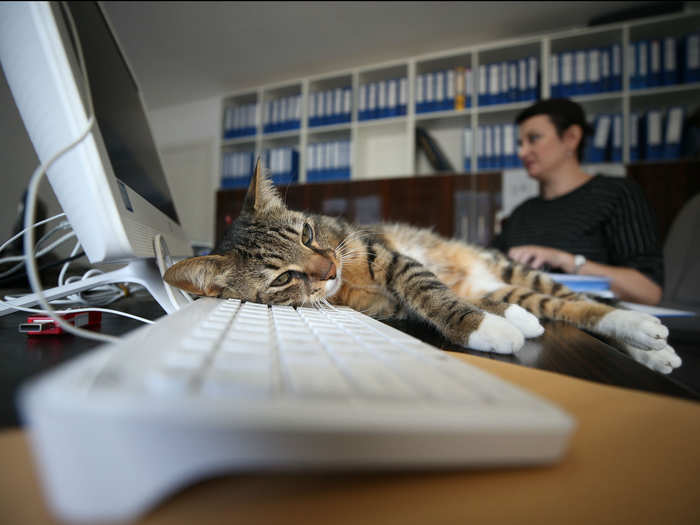- Home
- slideshows
- miscellaneous
- 6 tips to make anyone more successful at remote work, from a reporter who's been doing it for 20 years
6 tips to make anyone more successful at remote work, from a reporter who's been doing it for 20 years
1. Start your workday at a specific time and "end" at a specific time.

2. Exercise at least five days a week, something vigorous.

Exercise promotes endorphins, which help combat the blues or feeling sluggish. It increases mental sharpness and makes you better able to handle stress.
It's easy to drop this during times of stress or trouble and just hunker down and work (or in stressful times like these, to focus on coping). But just like working long hours daily, if you skip it, you will soon find your productivity and mental attitude diminishing.
Plan your exercise week, just as you plan your meetings.
3. You can exercise midday!

Just let your coworkers know you'll be out for an hour and add time to your workday to account for it. It doesn't matter if you return to the office after a workout. Your coworkers can't smell you. Or see you.
I prefer to work out before or after work, but some days midday is the only time that works. I will eat lunch at my desk on those days. (I often do that anyway.)
Think of it like a meeting. You would leave your desk and make yourself unavailable if you had a meeting. So if the only time your schedule allows you to exercise on a particular day is midday, then it's just like a meeting.
4. Your productivity will rise and fall.

Some days, I'm a focused, productive animal. Others, I'm easily distracted. This used to make me anxious. I thought that something was wrong with me and that my colleagues would think I was lazy on the days I was tired or ill or otherwise struggled.
Then I spent a week at the office during a business trip and saw everyone doing the same: chatting with coworkers, grabbing coffee in the kitchen, playing pingpong.
No one stays heads bent, working, every minute of every day.
WFH can make you more productive for a short amount of time by eliminating office distractions.
But if you work long hours at home for more than a couple of weeks, or skip exercise, you risk being less productive or eventual burnout.
If you balance, your productivity at home over time will be at least the same as office workers'.
People aren't robots. We are creative beings who operate on work-rest cycles.
5. Yes, it's lonelier, but there are fixes for that.

I gave up office camaraderie for this lifestyle and had to come to terms with a certain level of not knowing what was going on at work.
In the case of these mandatory shelter-at-home orders, many of us are not missing out on happy hours or office lunches, since everyone is in the same boat.
But that doesn't diminish feelings of loneliness. It may even make them worse.
You can avoid feeling like an island by interacting virtually with your office mates, like posting funny things on work chat rooms or attending your company's virtual lunches and happy hours.
If your company is big enough, your office may even have various Slack channels or other chats and groups dedicated to different topics: parents, women's, or LGBTQ and allies groups; book clubs; cooking clubs; and, if you're lucky, a board- or role-playing-game club. Ask around to find the chat room or email list and interact with those people on it.
If that won't cut it, hop on the phone with your best work buddy and shoot the breeze for a few minutes. Don't worry or feel guilty about the 15 to 20 minutes you are doing this instead of "working." It is no different from the time you would spend stopping by someone's desk to chat.
6. Volunteer to do tasks you might not normally do.

Working from home, you may feel invisible. That feeling can be even harsher if the coronavirus has kept you from being able to produce as many customer meetings, product updates, or other work products as you normally would.
And that can be really scary as the economy tanks and layoffs are happening en masse.
This is a good time to "be the change you want to see" and do tasks that are helpful to your coworkers that you haven't been asked to do: Update documentation; offer a training session on something you are good at; organize video events for your customers; offer to help a coworker who is overwhelmed, even if that coworker is in a different department.
By raising your hand for tasks outside your job description, you are not just giving to your team but are opening the door for people to reach out to you and let you know your efforts are meaningful and appreciated.
Popular Right Now
Popular Keywords
Advertisement